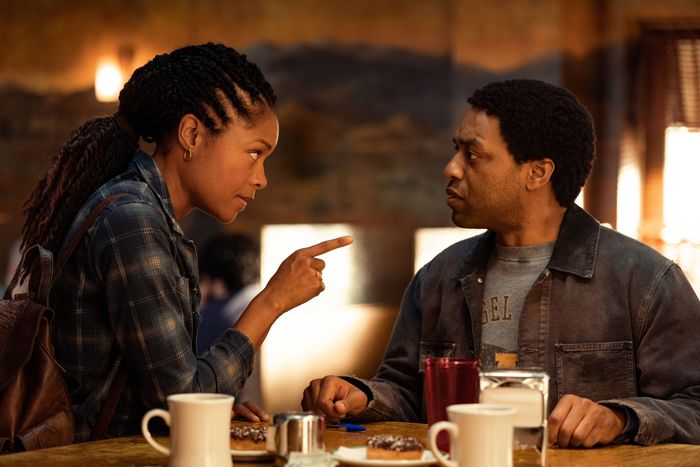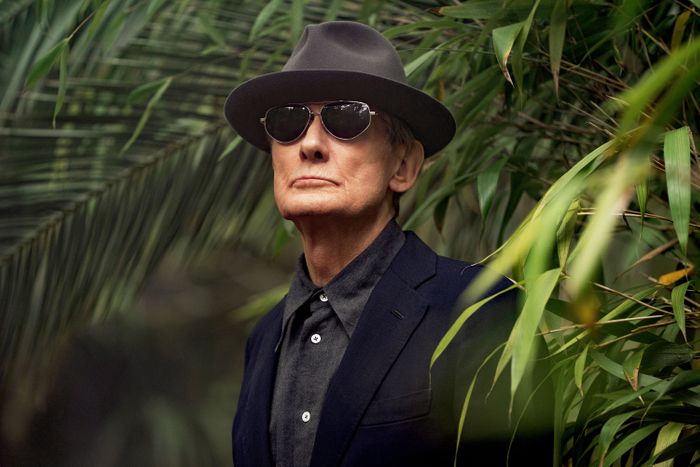
The split timeline is a plague on TV, and its latest victim is Showtime’s The Man Who Fell to Earth. The effects of in medias res framing are simultaneously specific and broad, and none of them are exactly good. For an individual series, they sap the story of its inherent tension by telling viewers where the narrative is going. On a larger scale, they train audiences to demand answers right as they go into a new experience rather than receiving them incrementally over time, and that sort of immediacy is counterintuitive to long-form storytelling. (It’s hard not to recognize this phenomenon in the mini backlash to Severance’s season-one finale.) And so when The Man Who Fell to Earth’s premiere episode “Hallo Spaceboy” (airing April 24) opens with Chiwetel Ejiofor’s Faraday — suave, manipulative, and bespoke-ly tailored — giving an adoringly received TED Talk–style presentation before flashing back to his character’s intergalactic journey across space and time to arrive on Earth, the series is already operating at an disadvantage.
Theoretically, by the end of this season’s ten episodes, four of which were provided to critics for review, we know that Faraday will rise to the level of a new tech god, and as a result, all his affectations and awkwardness — which are the primary focus of the first half of the season — feel drawn out and overemphasized. The experience of watching The Man Who Fell to Earth is impatiently waiting for the next thing to happen so the final thing we know will happen will finally happen, and that’s an unfortunate frustration given that several elements of the series hold genuinely intriguing potential.
The adaptation’s connection with Walter Tevis’s 1963 novel and Nicolas Roeg’s 1976 film starring David Bowie is well-considered, with enough nods that fans of those works will recognize the DNA connecting this project to its predecessors (like the series’s episode titles, lifted from Bowie songs), but not so many links that new viewers will be left adrift. Jimmi Simpson, Clarke Peters, and Bill Nighy tear into the material in alternately amusing and engaging ways, with the latter’s sarcastic line deliveries a particular highlight. His shrugging “I got distracted” in response to why his character didn’t do more to save the planet is grade-A stuff, as is the way he nonchalantly lights a cigarette right after, and it’s a serious miscalculation that Nighy only shows up for one significant scene in four hours.
Visually, when co-creator and director Alex Kurtzman (of Tom Cruise’s failed Dark Universe kickoff The Mummy) takes a break from his over-reliance on sped-up intercuts, split-second flashbacks, and cheesy-looking CGI (why not just film a real jukebox or cash bills instead of relying on distracting visual effects?), he demonstrates a strong understanding of how to push the boundaries of the frame. A shot of Faraday onstage, with his actual body in the foreground and the lower half of his face replicated in gigantic vertical screens in the background, is an unnerving allusion to his physical otherness; the use of a fish-eye lens during an unearthly meeting between Ejiofor and Nighy’s characters in a verdant oasis gives that scene a pleasantly trippy quality. Overall, though, The Man Who Fell to Earth demands a level of patience that hasn’t yet paid off, and the inconsistencies in its narrative and characterizations don’t provide high hopes for the remaining six episodes, either.
Faraday (Ejiofor) is introduced as a self-described refugee, and “Hallo Spaceboy” admittedly gets off to an exciting start with his journey through the beautifully colorful and desolate cosmos and his crash-landing in New Mexico, after which he adopts a skin suit that covers his reptilian-looking body and eyes. But The Man Who Fell to Earth leans too hard on this extraterrestrial — who takes the name “Faraday” from the police officer who books him for trespassing (Martha Plimpton, given depressingly little to do) — being unaware of human norms or how to speak English, and the series’s attempts to mine humor from this ongoing confusion has decreasing returns. At its core, The Man Who Fell to Earth is about moral weakness and how we, as a species, fail ourselves over and over through lapses in willpower — not doing enough to stop war because it makes us rich or combat climate change because it’s too hard. But spending so much time with a goofy Faraday diminishes the impact of those urgent considerations.
Ejiofor — with his staggered speech pattern, wide eyes and agape mouth, and shuffling step — starts off the series seemingly doing his own version of Vincent D’Onofrio’s Edgar the Bug from Men in Black. That would be a reasonable character-development device for an episode or so, as Faraday gets the hang of things on Earth. But the series wants to use Faraday’s social awkwardness as a source of humor, so it extends this behavior (which borders on offensive, especially when another character describes him as being “on the spectrum”) into all four episodes. Most often, he’s repeating words like “fuck” and phrases like “ta-da” with a tone of aghast wonder and enunciations on the wrong syllables. Less often, though, he’s stringing together complex sentences about quantum fusion and plasma disruptions and bossing others around, which is far more in line with Ejiofor’s strengths as an actor but not showcased nearly enough. The series is indecisive about who Faraday is, and that sense of just figuring things out sprawls outward as more characters are integrated into the narrative to either join forces with or face off against Faraday on the “mission” he was sent from the planet Anthea to complete.
First up is Justin Falls (Naomie Harris), a once-promising scientist who ran away from her career after a personal tragedy. Now she cleans up hazardous waste near the Los Alamos National Laboratory for cash she uses to pay her ill father Josiah’s (Clarke Peters) medical bills and care for her daughter Molly (Annelle Olaleye). She has no idea who Faraday is or why he lists her as an emergency contact, but will she soften to him over time, in a nod to the original novel? Probably! Faraday’s mission involves finding a mysterious genius named Thomas Jerome Newton (Nighy), whose patents in the 1970s and ’80s revolutionized the tech world — before he disappeared, leaving a 10th patent written in an ancient language no one can understand but which the U.S. government fiercely covets. As Faraday and Justin team up to investigate the company Newton created, Origin, which is now based in London and run by seeming baddie Edie Flood (Sonya Cassidy), they’re trailed by CIA agent Spencer Clay (Jimmi Simpson), a certified maniac who gets off on irritating waitresses with his overly complex dinner orders and smashing butterflies to death.
For all the chasing, though, The Man Who Fell to Earth’s pacing is mostly languid, its sense of urgency tepid. Certain scenes drag on far too long, in particular a negotiation between Edie, her estranged brother Hatch (Rob Delaney), and Faraday and Justin that plays out like diet Succession. Others zoom by too quick, including Faraday’s explanation of what quantum fusion is and why the world’s superpowers would be eager to stop it. Kurtzman and co-creator Jenny Lumet seem wary of the sci-fi concepts that undergird this whole endeavor, and choose instead to focus on interpersonal dynamics — which would be fine if that approach didn’t result in every female character taking action only when a man encourages her to do so, or in overly repetitive dialogue like the phrase “I’m not engaging” (a variation of which is uttered three separate times, including by Delaney’s Hatch to a particularly vulgar parrot).
If The Man Who Fell to Earth shakes off these deviations in the remainder of its first season, explores the immigration subtext it tosses around as a motivation for Faraday’s actions, allows Ejiofor to settle into the imperious mode he has such commanding control of, and lets Nighy do whatever he wants, perhaps the journey back to that opening scene in which Faraday asks, “How did we get here, to this place? This moment?” will feel worth it. But that’s a lot to ask from a series that seems unsure of what it wants to say about the sacrifices needed to save our world.
More TV Reviews
- Meghan Markle Pioneers New Frontiers in Unrelatability
- Marvel Won’t Let Daredevil: Born Again Live
- We Were Too Hard on Winning Time



